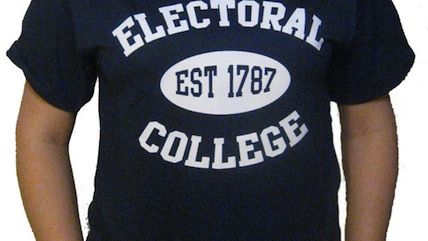The Other Way an Alternative Candidate Could Pick Up an Electoral Vote
When electors defect


Hillary Clinton is almost certain to carry Washington state next month. But she won't necessarily collect all of its electoral votes. Robert Satiacum Jr., one of the Democratic Party's slate of 12 electors in Washington, has been mulling in public about whether he can bring himself to vote for his party's nominee. He may yet fall in line, and he may simply give up his seat in the Electoral College. But there's a chance he'll cast his ballot for Bernie Sanders, Jill Stein, or some other person not named "Clinton" or "Trump."
This is the other way a minor-party candidate can eat into the major-party nominees' Electoral College totals: In 21 states, it is legal for a so-called "faithless elector" to ignore the popular vote and cast a ballot for someone else. So while we're pondering the possibility that Evan McMullin might carry Utah or Gary Johnson might pull off an upset in New Mexico, let's take a moment to consider this other scenario. After all, a third-party candidate hasn't won a state outright since 1968, when George Wallace carried five states in the South. But in six of the 12 elections going back to then, faithless electors have voted for alternative candidates—or, sometimes, for people who weren't actually running for president at all:
• In 1968, Wallace didn't just win those five states; he picked up a vote from a Republican elector from North Carolina.
• In 1972, a Republican elector from Virginia voted for John Hospers of the Libertarian Party, making this both the LP's weakest year (they got only 3,674 votes on Election Day) and its strongest (it's the only time the party has broken into the Electoral College). That elector was Roger MacBride, who went on to become the Libertarian presidential nominee in 1976.
• In 1976, a Republican elector from Washington voted for Ronald Reagan, who had narrowly lost the GOP nomination that year to Gerald Ford.
• In 1988, a Democratic elector from West Virginia thought that her party's vice presidential nominee, Lloyd Bentsen, was a stronger candidate than Michael Dukakis. So she cast her presidential vote for Bensten and demoted Dukakis to VP.
• In 2000, a Democratic elector from the District of Columbia refused to cast a ballot at all, to protest the fact that D.C. doesn't have a vote in Congress. Since nobody got her vote, I consider this a moral victory for Wavy Gravy.
• In 2004, a Democratic elector from Minnesota flipped the ticket and voted for vice presidential nominee John Edwards—or technically, since spelling was not this person's strong suit, for "John Ewards." (Also that year, New York's entire slate of electors accidentally voted for some guy called "John L. Kerry" rather than Democratic nominee John F. Kerry. But this was just a typo, and the votes were ultimately assigned to the correct Kerry, so unfortunately it doesn't count.)
With Clinton opening her lead over Trump in the polls, it's very unlikely that a faithless elector will actually keep a candidate from accumulating the 270 ballots needed to win the White House. But that same lead may make it more likely for such electors to defect in the first place. Regular voters are probably more likely to back third-party or independent candidates when the election looks like it's going to be a blowout: If the lesser evil is either sure to win or sure to lose, you might as well give your support to a protest candidate instead. When the Electoral College votes, more than a month after Election Day, that effect may be magnified: These people already know who won the popular vote and whether the margin is close. A Clinton-hating Democrat like Satiacum—or a NeverTrump Republican, which isn't exactly a scarce species these days—would feel even less constrained from voting his or her conscience.
So even if the alternative candidates don't manage to carry any states this year, we may see a third name, or even a fourth name, in this year's Electoral College results. Maybe Johnson. Maybe McMullin. Maybe Stein. Maybe someone else. Darrell Castle! Darryl Perry! Princess Khadijah Jacob Fambro! HRM Caesar St. Augustine de Buonaparte! Sweet Meteor O'Death! Think big, everyone!


Show Comments (32)